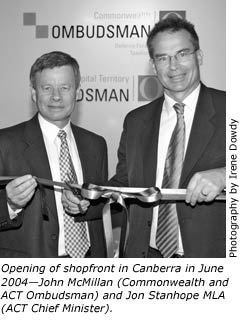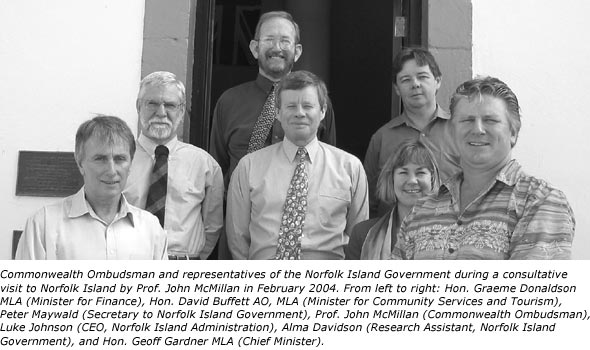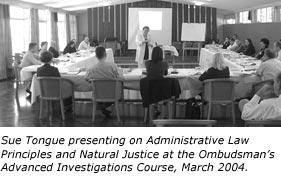Commonwealth Ombudsman Annual Report 2003-04 | Chapter 1
![]()
Chapter 1 | Year in Review
Introduction
 This was the first full year in office for Prof.
John McMillan as Commonwealth Ombudsman and Mr Ron Brent as Deputy Ombudsman, both having been appointed in the first half of 2003.
This was the first full year in office for Prof.
John McMillan as Commonwealth Ombudsman and Mr Ron Brent as Deputy Ombudsman, both having been appointed in the first half of 2003.
During the year, the Ombudsman and Deputy Ombudsman pursued the objectives set out in the foreword in last year's annual report. Specifically, the objectives were to continue the tradition of the Ombudsman in handling and investigating complaints about government received from members of the public, to distil the wisdom of the office, and to cultivate the established profile of the Ombudsman's office as a key accountability institution in Australian Government.
The essence of the office has not changed. We continue to assess and investigate complaints about the administrative actions of Australian Government departments and agencies and to foster good public administration by recommending remedies and changes to agency decisions, policies and procedures. We also make submissions to government on legislative and policy reform.
'… the Ombudsman has been able to stimulate improvements across the breadth of government administration.'
Building on the experience and insights gained from handling complaints, the Ombudsman has been able to stimulate improvements across the breadth of government administration. Among the areas improved are the quality of decision making, internal complaint handling, transparency, record keeping, communication with the public, and sensitivity to individual needs.
A constant challenge for the office is to maintain a public profile and for the public to know they can turn to the office when problems with government arise. An important step towards meeting this challenge was the opening of a shopfront in Canberra in June 2004. While complaints and inquiries are received through the Ombudsman's eight offices in capital cities around Australia, the opening of a shopfront in Canberra was considered important, both symbolically and practically.
'… visibility is a key component of our relationship with the public.'
Most complaints, inquiries and approaches to the office come through telephone, mail and increasingly via the Internet; however, the shopfront is an important step in reaffirming that public accessibility is a vital aspect of our work and that visibility is a key component of our relationship with the public. It also signifies the continuing commitment of the office to be active in the community in dealing with problems that people encounter with government.
COMPLAINT WORKLOAD
During 2003–04, the Ombudsman received a total of 17,496 complaints, a decrease of 12% on the previous year. Decreases in the number of complaints received were experienced in most areas, with significant decreases in complaints about the Department of Immigration and Multicultural and Indigenous Affairs, the Child Support Agency, Centrelink and the Australian Taxation Office. There was an increase in complaints about the Department of Transport and Regional Services and the Department of Employment and Workplace Relations.
The decrease in total complaints received is against the trend over the past few years, during which the number of complaints received has been fairly stable. There has, however, been a steady increase in the number of more complex matters. There was also a fall in the number of other approaches to the office such as out-of-jurisdiction matters and requests for information.
This year, the Ombudsman investigated 30% (5,910) of all complaint issues finalised, compared to 29% last year. For complaint issues investigated, agency error or deficiency was identified in 20% (compared to 29% last year), while there was no error or defect identified in 43% (compared to 42% last year).
PUBLIC ADMINISTRATION
An important role of the Ombudsman is to foster good public administration. A principal way of doing this is to make suggestions and recommendations to agencies, to initiate and conduct own motion investigations so as to foster systemic improvements in public administration and to make submissions to government and parliamentary inquiries.
Through its complaint-handling and investigative work, the Ombudsman's office comes into contact over time with most aspects of Australian Government. As stated in our strategic plan for 2003–04, a distinct role of the Ombudsman is to 'contribute to public discussion on administrative law and public administration' and to 'foster good public administration that is accountable, lawful, fair, transparent and responsive'.
During the year, the Ombudsman released reports on four own motion (or own initiative) investigations related to the Australian Taxation Office, the Department of Employment and Workplace Relations, the Child Support Agency, and the Australian Crime Commission. Under powers conferred by the Complaints (Australian Federal Police) Act 1981 (Complaints Act), Ombudsman staff worked on four special investigations relating to the Australian Federal Police (AFP). Two of these investigations will be completed in early 2004–05.
'… the Ombudsman released reports on four own motion (or own initiative) investigations …'
A number of own motion investigations are due to be completed in the coming year. One such investigation is looking at administrative matters relating to the Department of Defence's dealings with people under the age of 18 years. Another is looking at the quality of Freedom of Information processing by Australian Government agencies. To the extent possible, the Ombudsman's reports on own motion investigations are published in full or in an abridged version on our website.
In furthering the objective of fostering good public administration, the Ombudsman made submissions to parliamentary inquiries and commented on a range of administrative practice matters and legislative proposals during the year, including submissions to:
- the Senate Select Committee on Ministerial Discretion in Migration Matters
- the Senate Standing Committee on Foreign Affairs, Defence and Trade, in its Inquiry into the Effectiveness of Australia's Military Justice System
- the Joint Standing Committee on Foreign Affairs and Defence, in its Inquiry into Human Rights and Good Governance Education in the Asia Pacific Region
- the Joint Standing Committee on the National Capital and External Territories, in its Inquiry into Norfolk Island Governance
- the Senate Select Committee on Medicare, in its Inquiry into the Medicare Safety Net
- the Treasury's Discussion Paper on the Review of Aspects of Income Tax Self Assessment
- the review of Division 11A of Part 1D of the Crimes Act 1914 (Cth).
DEFINING THE OMBUDSMAN'S ROLE IN A CONTEMPORARY SETTING
The Ombudsman's office, though well established, is part of a system of government that is undergoing constant change. Some of those changes impact on the work of the Ombudsman, requiring the office to reflect on its role in government. Several aspects of change arose in 2003–04.
The legislation establishing the office of the Commonwealth Ombudsman was enacted in 1976, and has not been reviewed in any comprehensive fashion. A review is currently being undertaken by the office to improve and modernise the legislative framework, with a view to putting proposals to government for the enactment of a new Ombudsman Act. It is not proposed to change the role of the Ombudsman.
'A review is currently being undertaken by the office to improve and modernise the legislative framework …'
Work on the legislative framework review progressed substantially during 2003–04, but it will be some months into the coming year before we are ready to submit a final position to the Prime Minister. Some of the issues to be addressed include:
- a single drafting style to avoid apparent inconsistencies
- legislative acceptance of the government's decision that the Ombudsman should have jurisdiction over the actions of certain Australian Government contractors
- bringing the Ombudsman's jurisdiction to investigate AFP complaints under the Ombudsman Act, with features that recognise the special need of police actions for external oversight and accountability.
A major role of the Ombudsman is to handle complaints about the AFP, both at a national level and in relation to the performance of the AFP's community policing role in the ACT. The legislative basis for the Ombudsman's role is the Complaints Act. Reform of that legislative framework was proposed in a report in 2003 by the Hon. William Fisher AO QC, A Review of Professional Standards in the Australian Federal Police. The Ombudsman's office is contributing to a review within government of the Fisher Report and the framework for investigation of complaints against the police.
The Ombudsman's role in relation to policing also arose in a different light during the year. In June 2004 the Australian Government announced that it would establish an agency to investigate corruption in law enforcement agencies, including the AFP. An issue raised in public debate was the role of the Ombudsman in this respect. Our position, in broad terms, is that the Ombudsman should not be the chief agency responsible for investigating corruption allegations. However, there is a thread that links administrative misbehaviour and official corruption, and complaints about law enforcement action are sometimes made in strong and accusatory language. The Ombudsman's office, both in its Commonwealth and ACT guises, is contributing to the discussions within government about the framework for investigation of corruption allegations.
Yet another aspect of the Ombudsman's role under discussion in the past year was the role of Postal Industry Ombudsman (PIO). Drafting was carried out to amend the Commonwealth Ombudsman legislation to incorporate the role of PIO. This role is distinctive, in conferring jurisdiction upon a single ombudsman to investigate complaints about the actions of both public and private sector postal operators. Jurisdiction over the private sector poses a new challenge for the Ombudsman.
The office of the PIO will take over the existing role of the Commonwealth Ombudsman of investigating postal complaints against Australia Post. A costing regime will be developed in accordance with regulations for a self-funding scheme and for the cost of investigations to be charged on a proportionate basis to participants in the scheme. The PIO will have the normal powers of an ombudsman to require information or documents and to publish findings. The PIO will be required to observe procedural fairness in investigations. The scheme is expected to commence within six months of the PIO legislation being enacted by Parliament.
In December 2003, a Joint Standing Committee report on Norfolk Island Governance proposed that Norfolk Island should establish an office of Ombudsman. It was proposed that the Commonwealth Ombudsman take on the role, under an arrangement similar to that with the ACT Government. To explore the Committee's
recommendation the Ombudsman visited Norfolk Island early in 2004 and held discussions with the Legislative Assembly, officers of the Executive Government, and the Administrator. Discussions on the issue are proceeding, and a further visit by a representative of the Commonwealth Ombudsman is planned
for late 2004.
Another new function was recently given to the Commonwealth Ombudsman to conduct an annual review of new information-gathering powers conferred on the Building Industry Taskforce. This is a result of a Senate amendment to workplace relations legislation enacted in 2004.
INTERNATIONAL COOPERATION
Over the past three years, there has been a steady increase in the Ombudsman's international program, with study tours by senior-level delegations from China, Indonesia, Japan, Mauritius, Thailand and the United Kingdom, and representatives from other countries also visiting the office.
We completed the first year of two three-year, AusAID-funded programs in Indonesia and Thailand. These programs aim to facilitate the exchange of specialist advice, training, technical assistance and support to the ombudsman's offices. During the year, two of the three Thai Ombudsman, Mr Piya-Anant and General Meepien, visited our Canberra and Melbourne offices, providing a valuable opportunity to exchange knowledge and ideas.
The Ombudsman believes the office is well placed to play a key supporting role in the development and enhancement of ombudsman offices throughout the Asia–Pacific region. In this regard, we are currently exploring opportunities to provide advice and assistance to ombudsman institutions in the South Pacific.
KEY ACTIVITIES FOR 2003–04
The Australian Government recognised the role of the Ombudsman, allocating increased funding in the 2004–05 Budget to establish new roles for the office, expand delivery of Ombudsman services in regional and remote areas, and improve oversight of surveillance devices.
- Four own motion investigation reports were released, with 31 recommendations accepted by agencies and one not accepted; the Ombudsman decided not to take this matter further.
- A comprehensive review of the office's complaints management system and internal work practices was conducted, providing a strong basis for initiating improvements to achieve better integrated and streamlined work practices.
- The office's internal complaint investigation guidelines were reviewed to update and adapt them for online use in the new complaints management system environment.
 Ombudsman staff and representatives from a number of other agencies, State Ombudsman
offices and AusAID-sponsored participants attended the office's two investigation courses: a three-day Introductory Investigations Training Course in August 2003 and a five-day Advanced Investigations Training Course in March 2004.
Ombudsman staff and representatives from a number of other agencies, State Ombudsman
offices and AusAID-sponsored participants attended the office's two investigation courses: a three-day Introductory Investigations Training Course in August 2003 and a five-day Advanced Investigations Training Course in March 2004.- The office hosted several study tours of senior-level overseas delegations and visits of representatives from other countries.
- A satisfaction survey of a random selection of complainants was conducted.
- A range of policies and guidelines for human resource activities was developed and adopted, including a Conflict of Interest Policy, Occupational Health and Safety Policy and Guidelines, Work Level Standards, a Performance Management Program, and guidelines for study assistance, leave and salary packaging.
- A new two-year Certified Agreement was endorsed by 95% of employees who voted.
At the same time, however:
- We had to replace our complaints management system after a relatively short time, writing off $195,000 worth of this asset.
- The continued pressure on staff, particularly from the volume of more complex complaint issues, has had to be addressed through improved work practices and more quality control.
- The consequences of the almost simultaneous departure of the Ombudsman and Deputy Ombudsman late in 2002–03 were still being felt, with some key matters delayed.
OUTLOOK FOR 2004–05
In the coming year, the Ombudsman aims to:
- establish the office of the Postal Industry Ombudsman
- develop and implement an enhanced and effective outreach program to rural and regional Australia
- establish improved oversight of surveillance devices
- implement a new complaints management system with integrated work practices and complaint investigation guidelines
- enhance the capability for online complaint lodgement
- explore a benchmarking exercise with State Ombudsmen on performance measurement
- improve the efficiency and effectiveness of complaint handling, especially through implementation of the new complaints management system.
